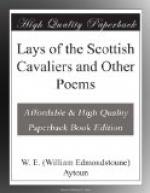This resolution was entered into at three in the afternoon, and orders were given to collect the men who had gone off in search of provisions. The officers dispersed themselves to Inverness and other places, and besought the stragglers to repair to the muir. But, under the influence of hunger, they told their commanders to shoot them, if they pleased, rather than compel them to starve any longer. Charles had previously declared, with his characteristic fervour, that though only a thousand of his men should accompany him, he would lead them on to the attack, and he was not now intimidated when he saw twice that number ready to assist in the enterprise, though some of his officers would willingly have made this deficiency of troops an excuse for abandoning what they esteemed at best a hazardous expedition. Having given out for watchword the name of his father, he embraced Lord George Murray, who was to command the foremost column, and, putting himself at the head of that which followed, gave the order to march.
The attempt proved peculiarly unfortunate, and, from the fatigue which it occasioned to the Highlanders, contributed in a great degree towards the disaster of the following day. The night chanced to be uncommonly dark, and as it was well known that Cumberland had stationed spies on the principal roads, it became necessary to select a devious route, in order to effect a surprise. The columns, proceeding over broken and irregular ground, soon became scattered and dislocated: no exertions of the officers could keep the men together, so that Lord George Murray at two o’clock found that he was still distant three miles from the hostile camp, and that there were no hopes of commencing the attack before the break of day, when they would be open to the observation of the enemy. Under these circumstances a retreat was commenced; and the scheme, which at one time seemed to hold out every probability of success, was abandoned.
“The Highlanders returned, fatigued and disconsolate, to their former position, about seven in the morning, when they immediately addressed themselves to sleep, or went away in search of provisions. So scarce was food at this critical juncture, that the Prince himself, on retiring to Culloden House, could obtain no better refreshment than a little bread and whisky. He felt the utmost anxiety regarding his men, among whom the pangs of hunger, upon bodies exhausted by fatigue, must have been working effects most unpromising to his success; and he gave orders, before seeking any repose, that the whole country should now be mercilessly ransacked for the means of refreshment. His orders were not without effect. Considerable supplies were procured, and subjected to the cook’s art at Inverness; but the poor famished clansmen were destined never to taste these provisions, the hour of battle arriving before they were prepared.”




